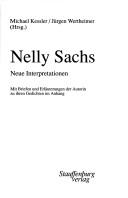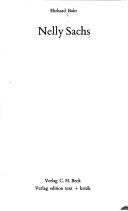| Listing 1 - 7 of 7 |
Sort by
|
Book
ISBN: 3499504960 Year: 1993 Publisher: Reinbek bei Hamburg Rowohlt
Abstract | Keywords | Export | Availability | Bookmark
 Loading...
Loading...Choose an application
- Reference Manager
- EndNote
- RefWorks (Direct export to RefWorks)
Sachs, Nelly --- Poets, German --- -German poets --- Biography --- Zaḳs, Neli --- Zaks, Nelli --- זאקס, נעלי --- זק״ש, נלי --- Biography. --- -Biography
Book
ISBN: 351804589X Year: 1984 Publisher: Frankfurt am Main Suhrkamp
Abstract | Keywords | Export | Availability | Bookmark
 Loading...
Loading...Choose an application
- Reference Manager
- EndNote
- RefWorks (Direct export to RefWorks)
Sachs, Nelly --- Poets, German --- -German poets --- Correspondence --- -Zaḳs, Neli --- Zaks, Nelli --- זאקס, נעלי --- זק״ש, נלי --- Correspondence. --- -Correspondence --- German poets --- Zaḳs, Neli

ISBN: 3860571303 Year: 1994 Volume: 30 Publisher: Zürich : Stauffacher,
Abstract | Keywords | Export | Availability | Bookmark
 Loading...
Loading...Choose an application
- Reference Manager
- EndNote
- RefWorks (Direct export to RefWorks)
Sachs, Nelly --- Criticism and interpretation --- Critique et interprétation --- -Zaḳs, Neli --- Zaks, Nelli --- זאקס, נעלי --- זק״ש, נלי --- -Criticism and interpretation --- Critique et interprétation --- Criticism and interpretation.

ISBN: 3406060714 9783406060717 Year: 1980 Volume: 16 Publisher: München: Beck,
Abstract | Keywords | Export | Availability | Bookmark
 Loading...
Loading...Choose an application
- Reference Manager
- EndNote
- RefWorks (Direct export to RefWorks)
Sachs, Nelly --- Criticism and interpretation --- -Zaḳs, Neli --- Zaks, Nelli --- זאקס, נעלי --- זק״ש, נלי --- -Criticism and interpretation --- Zaḳs, Neli --- Criticism and interpretation. --- Sachs, Nelly - Criticism and interpretation
Book
ISBN: 917000143X 9789170001437 Year: 1991 Volume: 114 Publisher: Stockholm: Kungl. biblioteket,
Abstract | Keywords | Export | Availability | Bookmark
 Loading...
Loading...Choose an application
- Reference Manager
- EndNote
- RefWorks (Direct export to RefWorks)
Poets, German --- Biography --- Exhibitions. --- -German poets --- -Exhibitions --- Sachs, Nelly --- -Zaḳs, Neli --- Zaks, Nelli --- זאקס, נעלי --- זק״ש, נלי --- Exhibitions --- -Biography --- German poets --- Biography&delete& --- Zaḳs, Neli --- Sachs, Nelly, --- Poets, German - 20th century - Biography - Exhibitions.
Book
ISBN: 1283400561 9786613400567 3110256738 9783110256734 9781283400565 311025672X 9783110256727 9783110256727 Year: 2011 Publisher: Berlin ; New York : De Gruyter,
Abstract | Keywords | Export | Availability | Bookmark
 Loading...
Loading...Choose an application
- Reference Manager
- EndNote
- RefWorks (Direct export to RefWorks)
Nelly Sachs. The Poetics of Silence and the Limits of Representation examines the poetry of the Nobel Prize-winning German Jewish poet Nelly Sachs. It firstly shifts established patterns of reception by analysing the author's reception in East and West Germany after the war and the role she came to play in the Federal Republic as a representative 'Poet of Reconciliation'. The study then situates Sachs' work within the framework of the debate surrounding the representation of the Holocaust by means of a thorough exposition of the aporia at the heart of Theodor Adorno's writings on post-Holocaust art. It demonstrates by close reading how Sachs' work is itself marked by this aporetic struggle and exposes in particular the aesthetic means by which Sachs renders this aporetic tension legible in her poetry through her use of, for example, prosopopoeia, her recasting of traditional metaphors and her reversal of biblical archetypes. The primary question addressed is whether Sachs' poetry, in spite of the fact that it thematises the impossibility of adequate representation, has representational value, or whether her work is bereft of concrete, representational meaning as a result of the often fragmented nature of her writing. In particular, the author confronts those critics who see in Sachs' work elements of consolation, reconciliation, or redemption in a transcendental realm, in favour of a reading that regards her work as permeated with the concrete events of the Holocaust and irreconcilably opposed to any notion of a religious sense-making and redemptive paradigm.
Deutsch-jüdische Studien.
---
German-Jewish Studies.
---
Holocaust Literature.
---
Holocaust-Literatur.
---
Nachkriegsliteratur.
---
Nelly Sachs.
---
Post-War Literature.
---
Sachs, Nelly.
---
Lyrik
---
LITERARY CRITICISM / European / German.
---
Gedicht
---
Poem
---
Dichtung
---
Poesie
---
Lyrisches Werk
---
Lyrikwerk
---
Gedichtwerk
---
Literatur
---
<
Book
ISBN: 1571138749 1571139850 1571135510 1322412006 Year: 2014 Publisher: Rochester, New York : Camden House,
Abstract | Keywords | Export | Availability | Bookmark
 Loading...
Loading...Choose an application
- Reference Manager
- EndNote
- RefWorks (Direct export to RefWorks)
Nelly Sachs (1891-1970) has long been regarded as one of the most significant Holocaust poets. Her conception of language and words as a landscape has been understood by scholars and critics as an exilic ersatz Heimat for the lost German homeland of a displaced poet. This reading, however, is based entirely on her postwar poems. Such an isolated approach to her complex body of work is increasingly historically problematic; it is also at odds with Sachs's generally cyclical poetic process.
In 'The Space of Words', Jennifer Hoyer offers the first sustained critical analysis of Sachs's largely unanalyzed prewar poetry and prose, as well as the first analysis that examines structural and thematic ties between the prewar works and the Nobel-Prize-winning postwar poetry. Through close readings of both Sachs's prewar and postwar works, Hoyer reveals a diasporic rather than exilic conception of the landscape of language, a position of constant wandering rather than static longing for return. This diasporic poetics promotes the intellectual and linguistic power of the wanderer and opens new insights into Sachs's essential significance as a Holocaust poet and a twentieth-century German-Jewish writer wary of the link of literary language to geopolitics and the narrative of nations. Jennifer Hoyer is Assistant Professor of German at the University of Arkansas.
Sachs, Nelly --- Zaḳs, Neli --- Zaks, Nelli --- זאקס, נעלי --- זק״ש, נלי --- Criticism and interpretation. --- LITERARY CRITICISM / Jewish. --- English studies. --- German studies. --- Holocaust poets. --- Jewish studies. --- Nelly Sachs. --- holocaust. --- language studies. --- language. --- linguistics. --- modern history. --- modern poetry. --- poetry. --- postwar poetry. --- twentieth century. --- world history. --- world war II.
| Listing 1 - 7 of 7 |
Sort by
|

 Search
Search Feedback
Feedback About UniCat
About UniCat  Help
Help News
News